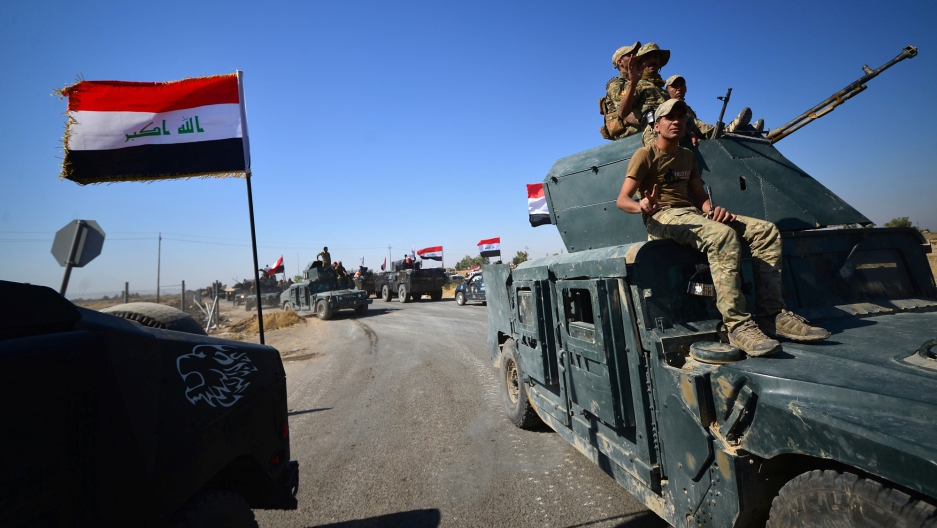Iraqi government forces continued on Tuesday their advance on Kurdish-held regions in the northern province of Kirkuk and other areas, forcing the Peshmerga to withdraw from regions it had gained during its fight against ISIS.
In a further blow to Kurdish dreams of independence, Iraqi forces took control of the two largest oil fields in Kirkuk. The fields accounted for around 250,000 barrels per day of the 650,000 bpd that the autonomous Kurdish region exported under its own auspices and their loss deals a huge blow to its already parlous finances and dreams of economic self-sufficiency.
Iraqi forces took down the red, white, green and yellow Kurdish flags that had flown over the pumping stations of the Bai Hassan and Havana oil fields and raised the national flag, an AFP photographer reported.
“With the loss of these fields, Kurdish finances have been cut in half,” French geographer and Kurdistan specialist Cyril Roussel told AFP.
The Kurds govern three mountainous northern provinces of Iraq in an autonomous region, and have also held a wide crescent of additional territory in northern Iraq, much of which they captured after helping drive out ISIS. The Peshmerga withdrew in the direction of their autonomous region in the northeast.
In the second day of a lightning government campaign to take back towns and countryside from forces of the Kurdish autonomous region, the Peshmerga pulled out of the long disputed Khanaqin area near the Iranian border.
The Baghdad government recaptured territory across the breadth of northern Iraq from Kurds on Tuesday, widening a sudden and dramatic campaign that has shifted the balance of power in the country almost overnight.
Government troops took control of the last two oil fields in the vicinity of Kirkuk, a city of 1 million people that the Peshmerga abandoned on Monday in the face of the government advance. A Yazidi group allied to Baghdad also took control of the town of Sinjar.
Masloum Shingali, commander of the local Yazidi militia in Sinjar, said the Peshmerga left before dawn on Tuesday, allowing Iraqi forces to move in.
The government advances have redrawn the map of northern Iraq, rolling back gains by the Kurds who infuriated Baghdad last month by holding a referendum on independence.
The referendum, though not binding, reflected the Iraqi Kurds aspirations for independence for their autonomous northern region. The vote was rejected by the central government in Baghdad, as well as Turkey, Iran and the United States.
Prime Minister Haidar Abadi ordered his troops on Monday to raise their flag over all Kurdish-held territory outside the autonomous region itself. They achieved a swift victory in Kirkuk, reaching the center of the city in less than a day.
The advances create a dilemma for Washington, which is close allies of both Baghdad and the Kurds, and has armed and trained both sides as part of its successful campaign to drive ISIS out of Iraq.
“We don’t like the fact that they’re clashing. We’re not taking sides,” President Donald Trump told reporters at the White House on Monday. “We’ve had for many years a very good relationship with the Kurds as you know and we’ve also been on the side of Iraq.”
So far most of the advances appear to have come unopposed, with Kurds withdrawing before government forces move in. There have been reports of just one major clash, in the early hours of
Monday on the outskirts of Kirkuk, which Washington described as a misunderstanding.
For the Kurds, the loss of territory, particularly Kirkuk which Kurdish folklore views as the heart of their homeland, is a severe blow just three weeks after they voted to declare their decades-old objective of an independent state.
The setbacks have led to sharp accusations among the two main Kurdish political parties, which each control separate units of Peshmerga fighters.
Officials in the KDP of Kurdish regional government leader Masoud Barzani accused the PUK of his longterm rival Jalal Talabani of “treason” for abandoning Kirkuk. The widow of Talabani, who served as ceremonial Iraqi president in Baghdad from 2003-2014 and died two weeks ago, denied blame.
Talabani said her party tried, but failed, to make the Iraqi government renounce the ”plan to attack” Kirkuk through contacts with US and Iraqi government representatives.
Rudaw TV, one of the main Kurdish stations, said Barzani would soon make a statement calling on the Kurdish factions to avoid “civil war”.
Oil officials in Baghdad said all the oil fields near Kirkuk were working normally on Tuesday after the last of them came under government control. Kirkuk is the base of Iraq’s Northern Oil Company, one of the two giant state oil firms that provide nearly all government revenue.
Meanwhile, thousands of civilians were seen streaming back to Kirkuk, driving along a main highway to the city’s east. The Kurdish forces had built an earthen berm along the highway, reinforced by armored vehicles, but were allowing civilians to return to the city.
Many returnees were seen with their children and belongings packed tight in their cars.
Kurdish residents said they felt betrayed by the Peshmerga’s hasty retreat after they had promised to fight to the last for the city.
“Kirkuk was sold out, everyone ran away. But now the situation has stabilized, and people are returning to their homes. Nothing will happen, God willing, and Kirkuk will return to how it was,” said Amir Aydn, 28.
